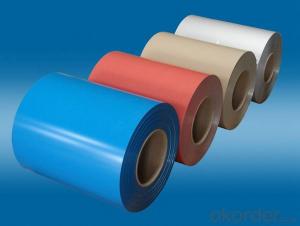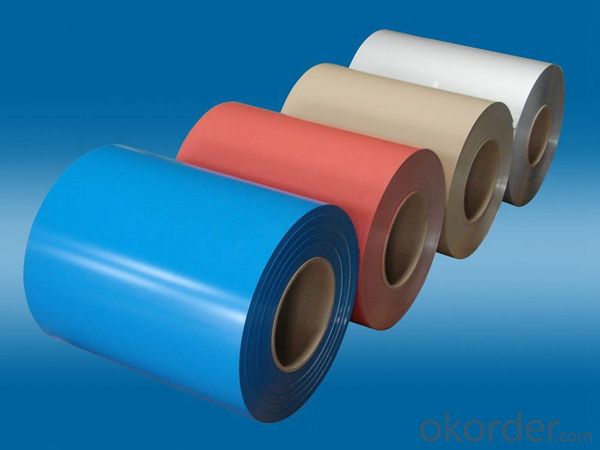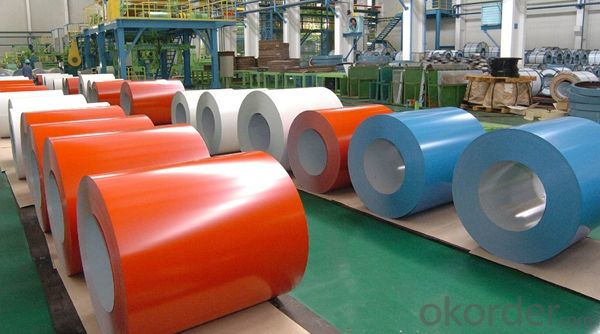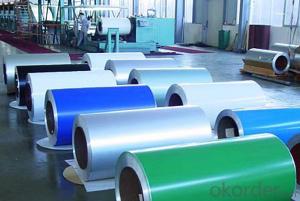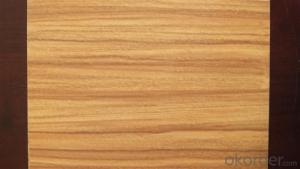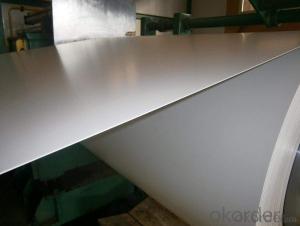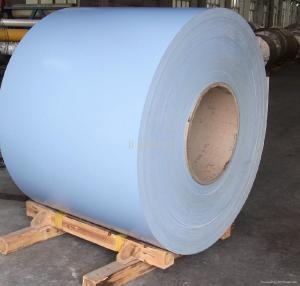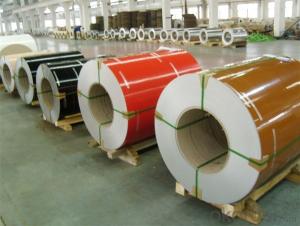Wrisco Aluminum Coil - Wooden Grain Coating PVDF Painting Aluminum Coil
- Loading Port:
- Shanghai
- Payment Terms:
- TT OR LC
- Min Order Qty:
- 5 m.t.
- Supply Capability:
- 10000 m.t./month
OKorder Service Pledge
OKorder Financial Service
You Might Also Like
Specification
1. Specification of Wooden Grain Coating Aluminium Coil PVDF Painting
Material | Alloy Aluminum 1XXX,3XXX,5XXX or customer nominated |
Temper | T3, T4, T5, T6 |
Surface | Anodize, electrophoresis, powder coating,PVDF coating, wood grain painting, matted, etc. |
Colour | Any colour based on Standard Germany RAL Mark |
Length | Coating 6.5 meters, Anodizing 6.5 meters, Mill finish 5 meters |
Press Machine | 500-4000 tons all together 64 press lines. |
Fabrication | 1. Windows and doors; 2. Drilling; 3. Bending; 4. Cutting; 5. etc. |
Certificate | ISO 9001 |
Moulding | 1. Using our moulds, no fee; |
2. Using customer drawing, opening mould, usually about 10~50 tons then the moulding can be refunded. | |
3. Mould cost is negotiable base on the order quantity | |
Capability | Annual output 100,000 tons |
2. Application of Wooden Grain Coating Aluminium Coil PVDF Painting
(1).Interior: wall cladding, ceilings, bathrooms, kitchens and balconies, shutters, doors...
(2).Exterior: wall cladding, facades, roofing, canopies, tunnels,column covers , renovations...
(3).Advertisement: display platforms, signboards, fascia, shop fronts...
3. Feature of Wooden Grain Coating Aluminium Coil PVDF Painting
Be free from Oil Stain, Dent, Inclusion, Scratches, Stain, Oxide Dicoloration, Breaks, Corrosion, Roll Marks, Dirt Streaks and other defect which will interfere with use
4. Certificate:
SGS and ROHS(if client request, paid by client), MTC(plant provided), Certificate of Origin(FORM A, FORM E, CO), Bureau Veritas and SGS (if client request, paid by client), CIQS certificate
5. Image of Wooden Grain Coating Aluminium Coil PVDF Painting
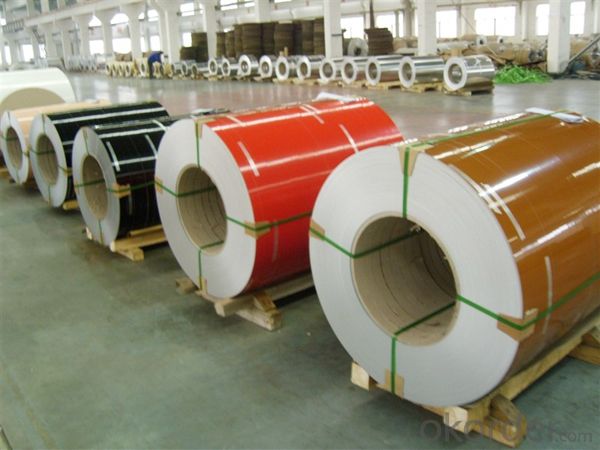
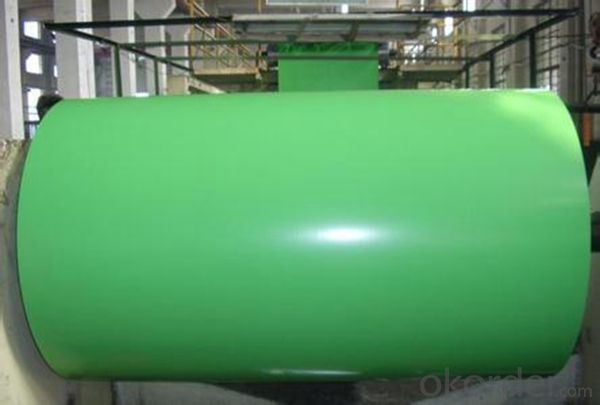
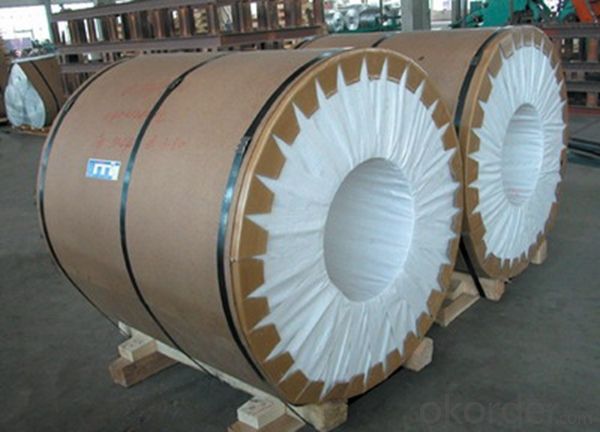
6. Package and shipping of Wooden Grain Coating Aluminium Coil PVDF Painting
eye to wall
eye to the wall
with wood pallet (wooded case also available)
7. FAQ
1) What is the delivery time?
Dpends on actual order, around 20 to 35 days
2)What is the QC system:
We have QC staff of 20 persons and advanced equipment, each production is with MTC traced from Aluminum ingot lot.
3) What market do you mainly sell to?
Australia, America, Asia, Middle East, Western Europe, Africa etc
- Q: What is the process of manufacturing aluminum coils?
- Manufacturing aluminum coils encompasses a series of steps. Initially, aluminum ingots or scrap are melted at high temperatures in a furnace. The molten aluminum is then moved to a continuous casting machine to solidify it into a long, thin slab known as a billet. Following that, the billet is heated and passed through rolling mills to decrease its thickness and form it into a coil. Referred to as hot rolling, this process encompasses multiple passes through the rolling mills, gradually reducing the aluminum's thickness. After hot rolling, the coil may undergo additional processes depending on the desired end product. For example, it may go through cold rolling to further decrease thickness and enhance the aluminum's surface finish. Cold rolling also imparts specific mechanical properties such as increased strength and hardness. Subsequently, the coil may be subjected to various surface treatments like cleaning, etching, or coating to improve its appearance and protect it from corrosion. These treatments involve chemical processes or the application of protective coatings. Finally, the aluminum coil is typically cut into smaller lengths, known as sheets or strips, and packaged for shipment to customers. These sheets or strips may undergo further processing like fabrication or forming to meet specific customer requirements. Overall, the manufacturing process of aluminum coils involves melting and casting the aluminum, hot and cold rolling to shape and refine it, surface treatments for protection and appearance, and cutting and packaging for distribution.
- Q: Can aluminum coils be used in the production of window frames?
- Indeed, window frames can be produced by utilizing aluminum coils. Aluminum, as a lightweight and robust substance, finds frequent application within the construction sector owing to its resistance to corrosion and impressive strength. Aluminum coils can be effortlessly molded into numerous configurations, including those suitable for window frames, thereby rendering them an optimal selection for the fabrication of windows. Furthermore, aluminum qualifies as a sustainable material that can be effortlessly recycled, thus establishing it as an eco-friendly alternative for window frame manufacturing.
- Q: Can aluminum coils be painted or coated after installation?
- Yes, aluminum coils can be painted or coated after installation.
- Q: Why does the hollow aluminium rolling shutter door fall off for a long time?
- The series of HO profiles is heated by Doyle's Aluminum Alloy bar by extrusion forming production, use the 6063 Aluminum Alloy material, has excellent plasticity, corrosion resistance, toughness, easy polishing, film. Aluminum Alloy thermal cooling fast, excellent seismic performance, the design of hollow base not only greatly reduce the heat conduction, but also effectively reduces the acoustic resonance effect, suitable for hot summer and warm winter area and some noise pollution area.
- Q: What are the environmental effects of utilizing aluminum coil?
- <p>Aluminum coil usage has several environmental impacts. While aluminum is recyclable and has a lower carbon footprint than some other metals, its production requires significant energy, leading to CO2 emissions. The mining and refining processes can also lead to habitat destruction and water pollution. However, its lightweight nature can reduce fuel consumption in transportation, mitigating some environmental effects. The recycling of aluminum saves energy and reduces waste, making it a more sustainable choice over time.</p>
- Q: What are the different sizes and dimensions of aluminum coils available?
- The sizes and dimensions of aluminum coils vary depending on the manufacturer and specific application. However, common sizes range from 0.2mm to 6mm in thickness and 100mm to 2000mm in width. Lengths can vary as well, typically ranging from a few meters to several hundred meters. These dimensions can be customized to meet specific project requirements.
- Q: How are aluminum coils coated or treated for specific applications?
- To cater to specific applications, various methods are employed to coat or treat aluminum coils. One commonly used approach involves the application of a protective coating, such as a polymer or paint, to enhance durability and resist corrosion. This coating is typically applied through a process known as coil coating, which evenly spreads a thin layer of coating material onto the surface of the aluminum coil. The coil coating process consists of several steps. Firstly, the aluminum coil undergoes a cleaning procedure to eliminate any impurities or contaminants. This step is crucial in ensuring that the coating adheres properly to the metal surface. Following the cleaning process, a chemical pre-treatment is applied to the coil to enhance bonding between the aluminum and the coating material. Once the pre-treatment is complete, the coil is fed through a coating machine where the coating material is applied. The choice of coating material, whether it be liquid paint, powder coating, or a thin film, depends on the specific requirements of the application, such as desired appearance, durability, or chemical resistance. After the coating is applied, the coil is subjected to a curing process, which may involve baking the coil at high temperatures or exposing it to ultraviolet light. This curing process ensures that the coating material adheres effectively to the aluminum surface, providing excellent protection and longevity. In addition to protective coatings, aluminum coils can also undergo other treatments for specific applications. An example of this is anodizing, a process that creates a thick, durable oxide layer on the surface of the aluminum. Anodizing enhances corrosion resistance, improves aesthetics, and can also serve as a base for further coatings or treatments. Furthermore, aluminum coils can be laminated with other materials for specific applications. For instance, they can be laminated with plastic films or adhesive coatings to provide insulation, moisture resistance, or other special properties. In conclusion, aluminum coils are coated or treated in various ways to meet the requirements of specific applications. Protective coatings, such as polymer or paint, are applied through processes like coil coating. Additional treatments, such as anodizing or lamination with other materials, may also be utilized depending on the desired properties and needs of the application.
- Q: Are aluminum coils suitable for architectural louvers?
- Yes, aluminum coils are suitable for architectural louvers. Aluminum is a popular choice for louvers due to its excellent corrosion resistance, lightweight nature, and high strength-to-weight ratio. Aluminum coils can be easily formed and fabricated into various shapes and sizes, making them ideal for creating aesthetically pleasing and functional louvers. Additionally, aluminum's durability ensures that the louvers can withstand harsh weather conditions and maintain their structural integrity over time. Overall, aluminum coils are a reliable and versatile material for architectural louvers.
- Q: Aluminum coil thickness measurement, real-time measurement of aluminum coil thickness value, you can use displacement sensor?
- You should use the eddy current displacement sensor KD2306 if the object is aluminum,
- Q: This question asks for a comparison of the benefits and drawbacks of utilizing aluminum coils in food storage.
- <p>Advantages of using aluminum coils for storing food include their excellent heat conductivity, which allows for even heating and cooling, making them ideal for temperature-sensitive food items. They are also lightweight, durable, and resistant to corrosion, which enhances their longevity. Additionally, aluminum coils are recyclable, contributing to environmental sustainability. Disadvantages include potential health concerns due to the leaching of aluminum into food, especially in acidic environments. There's also the risk of denting or scratching the surface, which can compromise the integrity of the coil and lead to contamination. Moreover, aluminum coils may not be suitable for all types of food storage, particularly those requiring airtight or vacuum sealing.</p>
Send your message to us
Wrisco Aluminum Coil - Wooden Grain Coating PVDF Painting Aluminum Coil
- Loading Port:
- Shanghai
- Payment Terms:
- TT OR LC
- Min Order Qty:
- 5 m.t.
- Supply Capability:
- 10000 m.t./month
OKorder Service Pledge
OKorder Financial Service
Similar products
Hot products
Hot Searches
Related keywords
